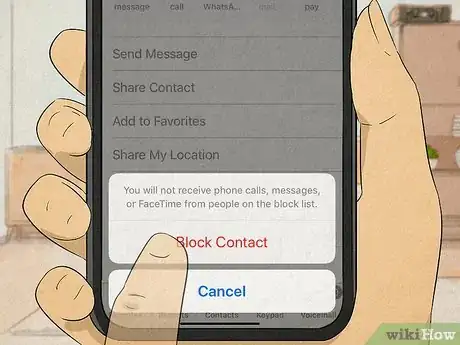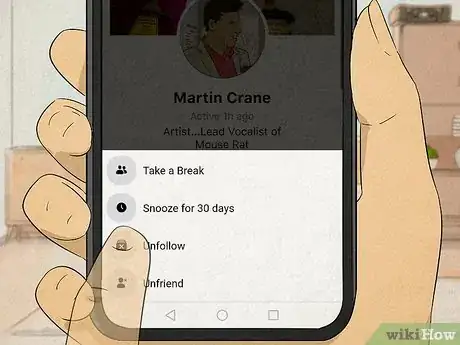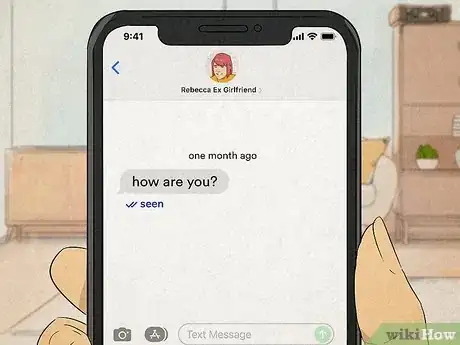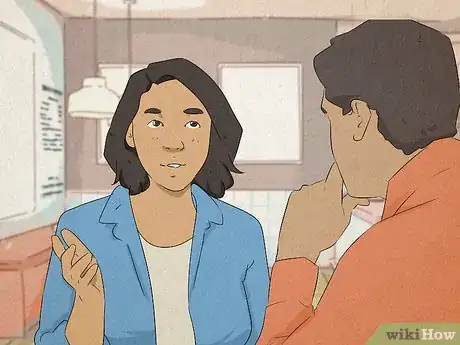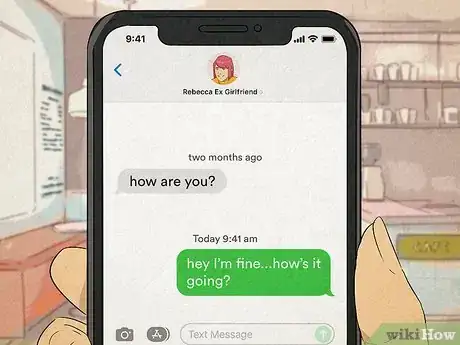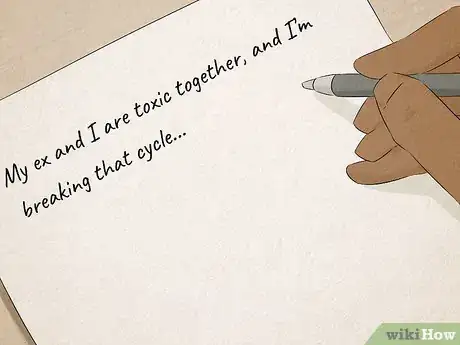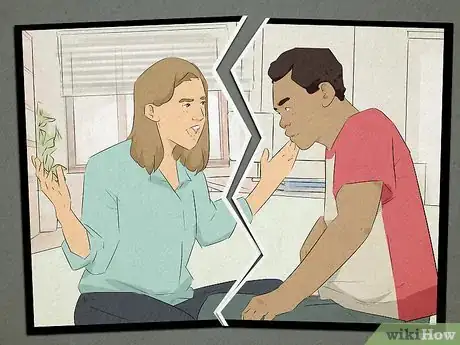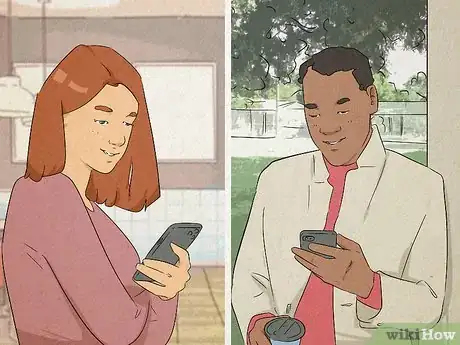This article was co-authored by Asa Don Brown, PhD, DNCCM, FAAETS and by wikiHow staff writer, Hannah Madden. Dr. Asa Don Brown is a Clinical Psychologist with over 25 years of experience. He specializes in working with families, children, and couples, treating a variety of psychological disorders, trauma, and abuse. Dr. Brown has specialized in negotiation and profiling. He is also a prolific author having published three books and numerous articles in magazines, journals, and popular publications. Dr. Brown earned a BS in Theology and Religion with a minor in Marketing and an MS in Counseling with a specialization in Marriage and Family from The University of Great Falls. Furthermore, he received a PhD in Psychology with a specialization in Clinical Psychology from Capella University. He is also a candidate for a Masters of Liberal Arts through Harvard University. Dr. Brown is a Fellow of the American Academy of Experts in Traumatic Stress and a Diplomate for the National Center for Crisis Management and continues to serve a number of psychological and scientific boards.
There are 8 references cited in this article, which can be found at the bottom of the page.
This article has been viewed 24,228 times.
Not every breakup requires the no contact rule, but it’s a great tool to use if you’re having trouble getting over your ex or you’re tempted to reach out to them again. Implementing the no contact rule can help you move on from your ex much faster (and sometimes, it can even bring you and your ex back together). We’ve listed out some helpful tips to keep you from contacting your ex-partner as you focus on yourself and your own emotions.
Steps
Block your ex’s number.
-
You don’t want to give them the chance to reach out to you. By blocking their number, you can ensure that they won’t be able to call or text you, so you won’t feel tempted to respond. You can also delete the number from your contacts so you aren’t forced to see it in your phone all the time.[1] X Research source
- However, don’t block your ex if you need to talk about logistics, like kids or financial responsibilities.
Unfollow them on social media.
-
Browsing social media should be a distraction, not a reminder. It’s a good idea to unfollow your ex on Facebook, Instagram, and Twitter, at least for now. If you don’t want to unfollow them completely, try muting their posts or blocking them until you’re a little more healed from your breakup.[2] X Research source
- Blocking your ex on social media is a good way to stop them from reaching out, too.
Delete old messages and DMs.
-
Looking through old conversations can really be a bummer. Even if you’re not strictly “contacting” your ex, looking through old communication can tempt you into reaching out. Delete those old text threads and any DMs you shared, just to be safe. It will probably make you feel better in the long run, and it can help you move on just a little bit faster.[3] X Research source
- The no contact rule is all about helping you to move on. The more you can do that, the easier it will be to heal.
Ignore any messages that your ex sends.
-
If your ex is persistent, they might find a way to contact you. The whole point of the no contact rule is to have absolutely zero contact with your ex, even if they initiate it. If your ex reaches out via phone, text, or email, just leave them on read.[4] X Research source
Ask your friends not to tell you about your ex.
-
Friends might be well-meaning, but you don’t need to hear that right now. If you have mutual friends with your ex, ask them not to update you on what your ex is doing or who they’re with. Even if they think you’d want to know, hearing that kind of stuff can make you feel worse—and you definitely don’t need that kind of energy in your life.[5] X Research source
- You could say something like, “Hey, I know you and Jason still hang out, which is fine. Would you mind just not talking about him around me? It’s all still a little fresh, and I’m just trying to focus on myself right now.”
- If you follow any of your ex’s friends on social media, consider unfollowing them so you don’t get any inadvertent updates.
Set a timeline for the no contact rule.
-
Most people go no contact for 30 to 90 days. You don’t need to cut your ex out of your life forever—a couple of months is usually a good amount of time to give yourself to heal. If you feel like you need more time, that’s absolutely fine (and if you feel like you need less time, that’s okay, too).[6] X Research source
- After your no contact timeline is up, feel free to unblock your ex and refollow them on social media. However, don’t feel like you have to reach out to them again—some people don’t ever talk to their exes after a breakup, and that’s okay.
Write down why you’re doing this.
-
This will remind you to keep going when the times get tough. It can be really, really hard to hold yourself back from calling up your ex one lonely night. When you start the no contact rule, grab a sheet of paper and list out all the reasons why you’re sticking to no contact. Then, if you’re having a tough time, take a look at the list again as a reminder. You might include:[7] X Research source
- “My ex and I were not a good match.”
- “I was not happy when I was with my ex.”
- “My ex and I are toxic together, and I’m breaking that cycle.”
- “I want to focus on my needs, not my ex’s needs.”
Remember the bad times, not just the good ones.
-
It can be easy to romanticize your past relationships. When you find yourself getting lost in all the sweet memories of your ex, try balancing it out with some negative ones, too. You might remember the biggest fight you two had, or the time when you felt the most alone in your relationship. This isn’t to make you feel worse—it’s to remind you why you shouldn’t reach out to your ex again.[8] X Research source
- For every good memory, try to think of at least one bad one, too.
Give yourself time to grieve.
-
After a breakup, you might go through the 5 stages of grief. While there’s no guarantee you’ll go through all of them (or in any particular order), make sure you give yourself time to feel your feelings, especially without the distraction of contacting your ex. Lean on your support network, write down your feelings, and don’t be afraid to reach out for help, either.[9] X Research source
Distract yourself with friends.
-
If someone invites you out, say yes. It’s normal to want to isolate yourself from others after a breakup, but that can make you feel more lonely than you already are. Rely on your friends to take you out for a good time, and don’t be shy about making plans. The more you can live your life and have fun, the better![10] X Research source
- You don’t have to spend all your time with your friends talking about your breakup. If you just want to be distracted, tell them that, and let them come up with fun things for you to do to keep your mind off things.
Focus on self-care.
-
Do something nice for yourself every single day. Even small things, like buying yourself a coffee or taking a relaxing bubble bath can help you feel much better. Set aside 10 to 15 minutes every day to do a relaxing activity that you truly enjoy. It doesn’t sound like much, but it can really give you the time and the space you need to heal.[11] X Research source
- Self-care looks different for everyone, so don’t be afraid to try a few different things, like hiking, doing a face mask, reading a good book, or listening to new music.
Get to know yourself.
-
Now that you’re single, what do you like to do? Is there something you’ve been wanting to do but couldn’t while you were with your ex? Now’s your chance! Head out and take that solo trip you’ve been wanting to go on, or dive into a new art project you’ve been wanting to try. The more you can focus on yourself during this time, the better.[12] X Research source
- You could also reconnect with old friends or get a new pet. It’s up to you!
Try to move on from the relationship.
-
This might seem impossible now, but it can be done. Set your sights on the future, and try not to think about your ex or what could have been. Focus on yourself and your own goals, and avoid thinking about the past. Eventually, you’ll be able to live your life without giving your ex a second thought.[13] X Research source
- Everyone’s healing process looks a little different, and there’s no right or wrong way to move on from a relationship. If you can set your sights on the future, you’re already doing great!
Reach out to your ex if you want to get back together.
-
Sometimes, the no contact rule can make your ex realize what they were missing. If it’s been a few weeks (or even months) and you feel ready to talk to your ex again, you can unblock their number and re-follow them on social media. And, if you really feel like you want to get back with them, you can go ahead and reach out—they might just be happy to hear from you.[14] X Research source
- Deciding to reach out to your ex is a very personal decision, and one you shouldn’t take lightly. Try thinking about why the relationship ended in the first place—if there were issues that you feel like you could both work on, your new relationship might just work out. Use the no contact time to really think through the relationship so you can make a more informed decision.
You Might Also Like
 How to Get over a Breakup when You Still Love Each Other: 11 Things to Do
How to Get over a Breakup when You Still Love Each Other: 11 Things to Do
 How Long Should I Wait to Text My Ex-Girlfriend?
How Long Should I Wait to Text My Ex-Girlfriend?


 How Long Should You Wait to Date After a Breakup? Expert Advice on the Best Time to Move On
How Long Should You Wait to Date After a Breakup? Expert Advice on the Best Time to Move On








 How to Let Someone Down Easy After a Few Dates, with Examples
How to Let Someone Down Easy After a Few Dates, with Examples
References
- ↑ https://psychcentral.com/pro/recovery-expert/2019/06/going-no-contact#2
- ↑ https://psychcentral.com/pro/recovery-expert/2019/06/going-no-contact#2
- ↑ https://www.teenvogue.com/story/how-to-delete-ex-from-social-media
- ↑ https://taggmagazine.com/breaking-up-no-contact-rule/
- ↑ https://taggmagazine.com/breaking-up-no-contact-rule/
- ↑ https://f01.justanswer.com/11012014Jah/ca302468-ee3b-4d77-866c-643adf207f84_therulesofnocontact.pdf
- ↑ https://www.psychologytoday.com/us/blog/here-there-and-everywhere/201606/how-leave-narcissist-good
- ↑ https://www.psychologytoday.com/us/blog/love-online/202003/want-contact-your-ex-here-are-5-reasons-why-you-shouldn-t
- ↑ https://www.plannedparenthood.org/learn/relationships/healthy-relationships/how-should-i-end-relationship
- ↑ https://www.psychologytoday.com/us/blog/here-there-and-everywhere/201606/how-leave-narcissist-good
- ↑ https://www.psychologytoday.com/us/blog/me-you-us/201408/3-ways-take-care-yourself-after-breakup
- ↑ https://taggmagazine.com/breaking-up-no-contact-rule/
- ↑ https://www.psychologytoday.com/us/blog/here-there-and-everywhere/201606/how-leave-narcissist-good
- ↑ https://f01.justanswer.com/11012014Jah/ca302468-ee3b-4d77-866c-643adf207f84_therulesofnocontact.pdf
About This Article

